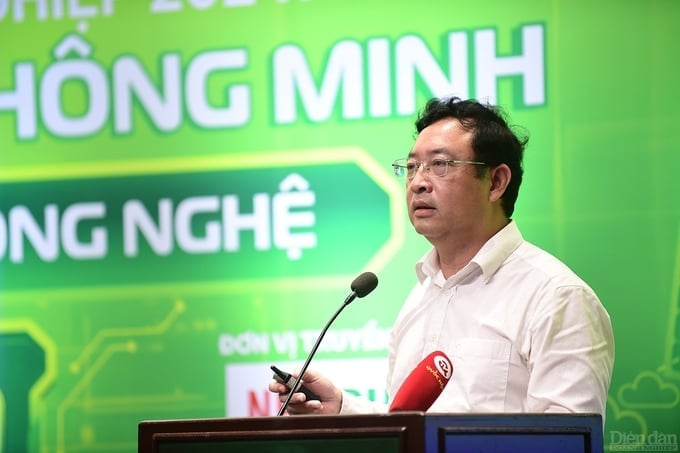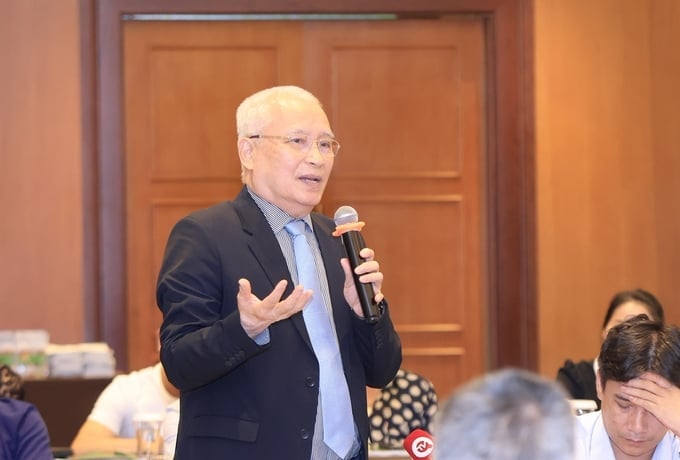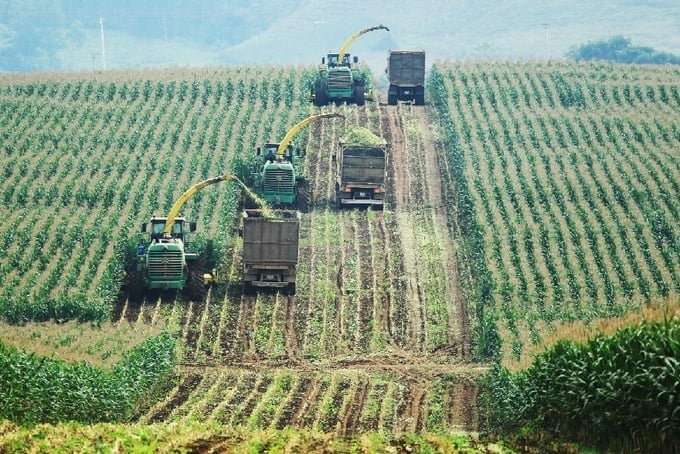June 17, 2025 | 22:59 GMT +7
June 17, 2025 | 22:59 GMT +7
Hotline: 0913.378.918
June 17, 2025 | 22:59 GMT +7
Hotline: 0913.378.918
The Ministry of Science and Technology assessed that the transition and application of the Industry 5.0 Movement require leadership from major corporations, as they are directly responsible for commissioning and addressing global, regional issues.
During nearly 40 years of reformation, agriculture has maintained its role as a key economic sector, contributing to the nation’s socio-economic development. Vietnam is one of the 15 largest agricultural exporters globally, with export revenue reaching 26.4 billion USD in 2023, which is an increase of over 17% compared to 2022.
Nguyen Do Anh Tuan, General Director of the International Cooperation Department under the Ministry of Agriculture and Rural Development, noted that agriculture has consistently maintained a high growth rate between 3 and 4 percent per year, with the most notable increase in 2021.
Notably, the country's agricultural export revenue reached 53 billion USD in 2023. Vietnam currently ranks among the top five suppliers of shark catfish, rice, coffee, cashew, black pepper, tea, cassava, and wooden goods worldwide. The country aims to achieve higher growth rates year-on-year, despite significant challenges in the agricultural sector.
"Key agricultural products including rice, coffee, pepper, and shark catfish have achieved world record yields. Conversely, natural resources are declining; agricultural production land either faces difficulties in expanding, is being converted to urban land, or is gradually degrading; water shortage is increasingly prevalent. Moreover, challenges also arise from new regulations on food safety and environmental technical barriers imposed by developed countries," General Director Tuan shared at the 2024 Agriculture Forum with the theme: Smart Agriculture Breakthrough with Industry 5.0 Technologies, organized by the Business Forum magazine.

Nguyen Do Anh Tuan, General Director of the International Cooperation Department, presenting at the forum. Photo: QT.
General Director Tuan remarked that the Vietnam's agricultural sector currently faces three major challenges: climate change, market volatility, and shifting consumer trends. Addressing these issues requires a reliance on technology.
"Only technology can help the agricultural sector redue the use of input, natural resource, and labor while still delivering higher value," General Director Tuan added.
These are the core ideas of the Sustainable Agricultural and Rural Development Strategy until 2023 with a vision towards 2050. The strategy focuses on promoting high-tech agriculture, sustainable farming, and comprehensive support policies, including land, credit, taxation, infrastructure, scientific research, and human resource development.
“The three key aspects of the strategy include ecological agriculture, modern rural areas, and a civilized farming community, which will foster a professional agricultural workforce,” General Director Tuan shared.
Regarding the Industry 5.0 movement, Pham Hong Quat, General Director of the Department of Market Development and Business Science and Technology under the Ministry of Science and Technology, stated that although various innovations from the Industry 4.0 movement such as artificial intelligence (AI) and blockchain encourage interactions between objects and machines, the 5.0 movement emphasizes the human element—humans interacting with and mastering the AI they create.
"AI will serve as a tool to address challenges in human life more effectively. In agriculture, the goal is to tackle global climate change challenges, achieve green transformation, and promote sustainable development," General Director Quat commented.
General Director Quat also assessed that the transition and application of the Industry 5.0 Movement require leadership from major corporations, as they are directly responsible for commissioning and addressing global, regional issues.
“Insights from leading corporations are crucial because they work alongside farmers to achieve tangible results. We are lacking leading figures in strategic sectors to foster competition,” General Director Quat concluded.

Pham Hong Quat, General Director of the Department of Market Development and Business Science and Technology at the Ministry of Science and Technology. Photo: QT.
The discussion session saw the participation of TH Group, a leading company that has comprehensively and seamlessly integrated smart agriculture throughout its high-tech closed-loop fresh milk production chain, as well as the in the production of clean, organic agricultural products.
Nguyen Minh Hai, Chairman of TH Group’s Board of Directors, emphasized that Vietnam is rapidly approaching the future of the Industry 5.0 movement. TH Group has adopted smart agriculture, particularly in livestock production, for the past fifteen years, gaining deeper insights into the movement.
“During the early stages, despite the vagueness of its concept, we adopted Industry 4.0 technologies early on and achieved considerable success. We have utilized scientific and technological advancements in agricultural production by integrating high technology, science, and management expertise, in combination with Vietnamese intelligence and natural resources, to unlock the potential strengths of the Vietnam's agricultural sector. Equipped with this experience and in the face of the Industry 5.0 Movement, TH Group will focus on two core issues: human resources and green, circular economy,” Chairman Ngo Minh Hai remarked.

Ngo Minh Hai, Chairman of TH Group’s Board of Directors, discussed the application of high technology at TH. Photo: QT.
As a pioneer in the application of high technology in sustainable agricultural production and the practice of circular and green economies in Vietnam, Chairman Ngo Minh Hai noted that although the Industry 4.0 movement introduced various tools, including AI, big data, and virtual assistants, the 5.0 movement emphasizes the interaction between humans and machines, further requiring the effective use of these tools.
“The Industry 5.0 Movement will blur the boundaries between physical and virtual spaces. As a result, we must demand further training and investment in new technologies, and our employees must learn to develop, access, and apply technology in the most effective way,” Chairman Ngo Minh Hai explained.
This development trend aligns with TH’s strategy. Namely, TH Group has focused on building a highly skilled workforce in science and technology, capable of mastering and operating advanced technological systems. Consequently, humans stand as a cornerstone of TH’s sustainable development strategy.
With the aim of advancing smart agriculture, TH continuously engages in research, development, and technology transfer collaborations with domestic and international partners to adopt, implement new technological solutions for agriculture. The group also invests in advanced automation systems and develops production models tailored to consumer demands.

High technology is one of TH Group's established strengths. Photo: TH.
Dang Kim Son, Vice Chairman of the High-Tech Agricultural Business Association, emphasized that both sustainable and modern agricultural developments must be established on the foundation of farmers and businesses.
Notably, corporations and businesses are the primary drivers in the application of science and technology. Vice Chairman Son also proposed that the government support these leading companies.
He highlighted the importance of establishing high-tech agricultural zones and regions in association with specialized key crop production areas. Additionally, the government and businesses should coordinate to invest in integrated infrastructure and support services within these areas.
It is essential to develop value chains into ecosystems led by major businesses that are responsible for processing, enhancing the value of agricultural products and delivering goods to market.
These core businesses are supported by local small and medium enterprises that provide input materials as well as production and trading services. On the other hand, cooperatives, farms, and farming households are connected to form a cohesive system in terms of technology processes and product origins, collectively supplying high-quality raw materials in a timely manner for processing and business activities.
Furthermore, Vice Chairman Son proposed the implementation of special incentive policies with the aim of attracting and supporting investment into high-tech agriculture from major corporations and businesses.
Translated by Nguyen Hai Long
/2025/06/17/3942-2-143243_548.jpg)
(VAN) Recently, in Sweden, the Secretary of the Binh Dinh Provincial Party Committee presented the Investment Registration Certificate for the 'Polyester Fabric Recycling Complex' project to SYRE Impact-AB Company.
/2025/06/12/3721-2-202745_83.jpg)
(VAN) TH made an impression at Seoul Food 2025 with its line of natural beverages, paving the way for Vietnamese food products to enter the South Korean market.

(VAN) Soc Trang's success in rice exports stems from a strategy of developing fragrant and specialty rice cultivation areas and standardizing production toward low-emission practices.
/2025/06/11/1311-5-120811_839.jpg)
(VAN) The pig farming industry is facing the challenge of comprehensive restructuring to meet requirements for quality, safety, traceability, and market expansion both domestically and for export.

(VAN) Vietnam considers participating in ALGROALBA in order to expand agricultural production, coordinate the assessment and effective exploitation potential land.
/2025/06/05/5314-1-184727_407.jpg)
(VAN) From seemingly worthless fish scales and skin, enzymes and lactic ferments can transform by-products into peptides, opening a sustainable, effective business direction and elevating Vietnamese seafood.

(VAN) TTC AgriS and IFC signed a strategic partnership to develop a sustainable agricultural value chain, aiming to achieve the Net Zero target by 2035.